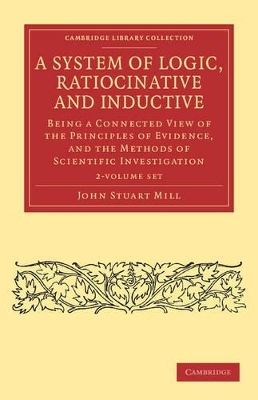
A System of Logic, Ratiocinative and Inductive 2 Volume Paperback Set
Cambridge University Press
978-1-108-04090-7 (ISBN)
- Keine Verlagsinformationen verfügbar
- Artikel merken
This two-volume work, first published in 1843, was John Stuart Mill's first major book. It reinvented the modern study of logic and laid the foundations for his later work in the areas of political economy, women's rights and representative government. In clear, systematic prose, Mill (1806–73) disentangles syllogistic logic from its origins in Aristotle and scholasticism and grounds it instead in processes of inductive reasoning. An important attempt at integrating empiricism within a more general theory of human knowledge, the work constitutes essential reading for anyone seeking a full understanding of Mill's thought. Volume 1 contains Mill's introduction, which elaborates upon his definition of logic as 'not the science of Belief, but the science of Proof, or Evidence'. It also discusses methods of logical reasoning - propositions and syllogisms. Volume 2 contains 'On the Logic of the Moral Sciences', in which Mills applies empirical reasoning to human behaviour.
Volume 1: Preface; Introduction; Book I. Of Names and Propositions: 1. Of the necessity of commencing with an analysis of language; 2. Of names; 3. Of the things denoted by names; 4. Of propositions; 5. Of the import of propositions; 6. Of propositions merely verbal; 7. Of the nature of classification, and the five predicables; 8. Of definition; Book II. Of Reasoning: 1. Of inference, or reasoning, in general; 2. Of ratiocination, or syllogism; 3. Of the functions, and logical value, of the syllogism; 4. Of trains of reasoning, and deductive sciences; 5. Of demonstration, and necessary truths; 6. The same subject continued; Book III. Of Induction: 1. Preliminary observations on induction in general; 2. Of inductions improperly so called; 3. On the ground of induction; 4. Of laws of nature; 5. Of the law of universal causation; 6. Of the composition of causes; 7. Of observation and experiment; 8. Of the four methods of experimental inquiry; 9. Miscellaneous examples of the four methods; 10. Of plurality of causes; and of the intermixture of effects; 11. Of the deductive method; 12. Of the explanation of laws of nature; 13. Miscellaneous examples of the explanation of laws of nature. Volume 2: Book III. On Induction (continued): 14. Of the limits to the explanation of laws of nature; and of hypotheses; 15. Of progressive effects; and of the continued action of causes; 16. Of empirical laws; 17. Of chance, and its elimination; 18. Of the calculation of chances; 19. Of the extension of derivative laws to adjacent cases; 20. Of analogy; 21. Of the evidence of the law of universal causation; 22. Of uniformities of co-existence not dependent upon causation; 23. Of approximate generalizations, and probable evidence; 24. Of the remaining laws of nature; 25. Of the grounds of disbelief; Book IV. Of Operations Subsidiary to Induction: 1. Of observation, and description; 2. Of abstraction, of the formation of conceptions; 3. Of naming, as subsidiary to induction; 4. Of the requisites of a philosophical language; and the principles of definition; 5. Of the natural history of the variations in the meaning of terms; 6. The principles of a philosophical language further considered; 7. Of classification, as subsidiary to induction; 8. Of classification by series; Book V. On Fallacies: 1. Of fallacies in general; 2. Classification of fallacies; 3. Fallacies of simple inspection, or à priori fallacies; 4. Fallacies of observation; 5. Fallacies of generalization; 6. Fallacies of ratiocination; 7. Fallacies of confusion; Book VI. On the Logic of the Moral Sciences: 1. Introductory remarks; 2. Of liberty and necessity; 3. That there is, or may be, a science of human nature; 4. Of the laws of mind; 5. Of ethology, or the science of the formation of character; 6. General considerations on the social science; 7. Of the chemical, or experimental method in the social science; 8. Of the geometrical, or abstract method; 9. Of the physical, or concrete deductive method; 10. Of the inverse deductive, or historical method; 11. Of the logic of practice, or art; including morality and policy.
| Reihe/Serie | Cambridge Library Collection - Philosophy |
|---|---|
| Verlagsort | Cambridge |
| Sprache | englisch |
| Maße | 140 x 218 mm |
| Gewicht | 1600 g |
| Themenwelt | Geisteswissenschaften ► Philosophie ► Logik |
| ISBN-10 | 1-108-04090-X / 110804090X |
| ISBN-13 | 978-1-108-04090-7 / 9781108040907 |
| Zustand | Neuware |
| Haben Sie eine Frage zum Produkt? |